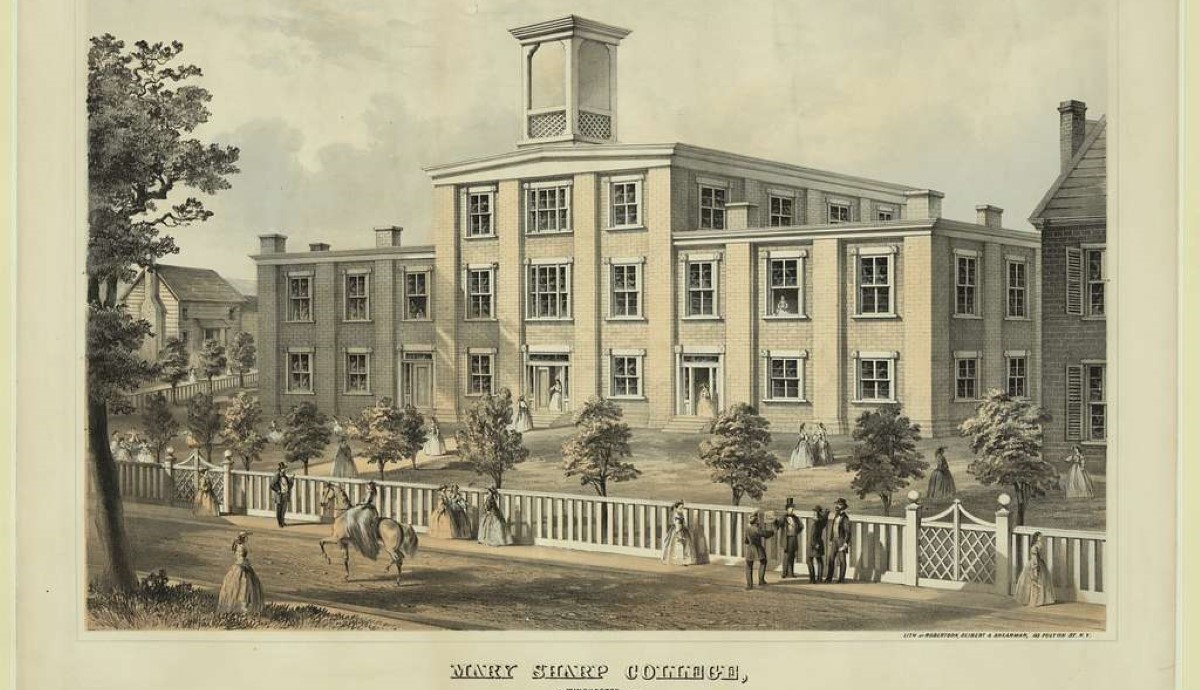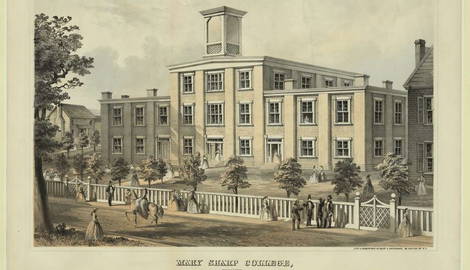
Known as the birthplace of country music and home to iconic Civil War battlegrounds, Tennessee’s heritage is as diverse as its landscapes. From its role in westward expansion to its contributions to American culture, the Volunteer State offers countless reasons to visit. Beyond its larger cities, Tennessee is dotted with historic towns that tell the story of its early settlers, battles for independence, and cultural evolution. Each town offers a unique glimpse into the past, making Tennessee a must-visit for history enthusiasts and travelers alike.
1. Jonesborough

Established in 1779, Jonesborough holds the title of Tennessee’s oldest town and is considered one of the most historic towns in the US. Its well-preserved Main Street showcases 18th- and 19th-century architecture, reflecting a rich history that includes serving as the capital of the short-lived State of Franklin.
You can explore several historic sites, such as the Chester Inn, built in 1797, which now operates as a museum offering insights into the town’s past. The Christopher Taylor House, dating back to 1777, provides a glimpse into early frontier life. Additionally, the Jonesborough United Methodist Church, constructed in 1847, stands as a testament to the town’s longstanding community spirit.
Jonesborough is renowned for its vibrant storytelling heritage, hosting the annual National Storytelling Festival, which attracts visitors worldwide. Strolling through the historic district, visitors can enjoy quaint shops, local eateries, and the town’s charming ambiance. Guided walking tours are available, offering deeper insights into Jonesborough’s storied past.
2. Dandridge

Dandridge is Tennessee’s second-oldest town, named after Martha Dandridge Washington, the nation’s first First Lady. It was established in 1793, and its history is evident in its well-preserved architecture and significant events. During World War II, the construction of Douglas Dam threatened to flood Dandridge. Residents successfully petitioned First Lady Eleanor Roosevelt, emphasizing the town’s unique namesake, leading to the construction of a protective dike that saved the historic district.
You’ll have the chance to explore several historic sites, including four original taverns: Roper Tavern (1817), Hickman Tavern (1820), Shepherd’s Inn (1814), and Thomas Tavern (1843). Shepherd’s Inn notably hosted Presidents Andrew Jackson, James K. Polk, and Andrew Johnson.
The downtown area, a registered National Historic District, offers boutiques, antique shops, and restaurants set against the backdrop of the Smoky Mountains and Douglas Lake.
Dandridge hosts annual events like the Scots-Irish Festival, celebrating the town’s heritage with traditional music, dance, and cuisine.
Outdoor enthusiasts can enjoy Douglas Lake, providing opportunities for boating, fishing, and swimming amidst scenic beauty.
3. Greeneville

Named after Revolutionary War hero Nathanael Greene, Greeneville holds the distinction of being the only town in the United States with this specific spelling.
Founded in 1783, it is perhaps best known as the home of Andrew Johnson, the 17th President of the United States and the first president to be impeached. Visitors can explore the Andrew Johnson National Historic Site, which includes his early home, tailor shop, and gravesite. This site offers a comprehensive look into his life and presidency.
The town’s historic district features a variety of 18th and 19th-century architecture. Notable sites include the Dickson-Williams Mansion, a circa-1821 historic house with Federal-style architecture, and the First Presbyterian Church, established in 1780, which played a significant role in the abolitionist movement in East Tennessee.
For those interested in local history, the Greeneville Greene County History Museum offers exhibits covering centuries of the region’s past. Additionally, the town is near the birthplace of legendary pioneer David Crockett, adding to its historical significance.
Greeneville’s downtown area is lined with numerous churches, reflecting Greene County’s strong faith base with more than 250 places of worship. The General Morgan Inn, a historic hotel and state-of-the-art conference center, is also located on Main Street, offering visitors a glimpse into the town’s rich heritage.
4. Franklin

This historic Tennessee town, founded in 1799, is renowned for its pivotal role in the Civil War, particularly the Battle of Franklin in 1864, one of the bloodiest battles of the conflict. When visiting it today, you can explore key historic landmarks like the Carter House, which bore witness to the battle, and Carnton Plantation, where its grounds became a burial site for over 1,500 soldiers. Both sites provide guided tours that delve into Franklin’s wartime history.
Franklin’s downtown district, a National Historic District, features beautifully preserved 19th-century architecture. Main Street is a bustling hub with locally-owned shops, award-winning restaurants, and art galleries, making it a favorite destination for visitors seeking both history and leisure.
Unique attractions like Harlinsdale Farm, a historic horse farm turned public park, and the Factory at Franklin, a former manufacturing plant now home to shops and event spaces, showcase the town’s adaptive reuse of historic structures.
Annual events, such as the Main Street Festival and Dickens of a Christmas, celebrate Franklin’s heritage and community spirit, offering visitors an immersive experience year-round.
5. Rogersville

Rogersville holds a vital place in Tennessee’s early history. It was the birthplace of The Knoxville Gazette (1791), Tennessee’s first newspaper, making it the state’s journalism capital before most cities even existed. The Tennessee Newspaper and Printing Museum brings this legacy to life with original equipment and artifacts.
One of the most unique natural phenomena in the world resides here: the Ebbing and Flowing Spring, a rare tidal spring that mysteriously rises and falls every few hours. Locals often suggest visiting it in the evening, as it’s most mesmerizing at twilight.
For those seeking to soak in early-American charm, the Hale Springs Inn (1824), once hosting Andrew Jackson, offers a historic stay. A short drive leads you to the Amis Mill Historic Site, established in 1780, a pre-Revolutionary War settlement where you can explore pioneer relics and even dine beside cascading waterfalls.
Rogersville is alive with Appalachian culture. Every October, the Heritage Days Festival turns downtown into a celebration of crafts, music, and storytelling, a true homage to East Tennessee traditions.
6. Clinton

Clinton, established in 1801, may look like a quaint Tennessee town, but its streets are woven with stories of resilience and transformation. In 1956, Clinton High School became the first public high school in the South to desegregate following the landmark Brown v. Board of Education ruling. The bravery of the “Clinton 12,” twelve African-American students who faced immense hostility, reverberated across the nation. Their legacy is preserved at the Green McAdoo Cultural Center, where powerful exhibits bring their courage to life.
The Historic Downtown Clinton Antique District draws collectors and casual visitors alike, with its eclectic shops housed in historic buildings that have stood for over a century.
Looking for serenity? The Clinch River, a haven for fishing and kayaking, meanders through the town, offering a peaceful counterpoint to Clinton’s powerful past. For an immersive dive into Appalachian culture, the nearby Museum of Appalachia showcases life in the region with authentic cabins, tools, and stories.
7. Elizabethton

Elizabethton, established in 1799, is a small town with a monumental past. Nestled in the Appalachian Mountains, it served as the site of one of America’s first experiments in self-governance: the Watauga Association. Formed in 1772, this independent government predated the U.S. Constitution and left an indelible mark on the town’s identity.
Visitors can step back in time at Sycamore Shoals State Historic Park. The park commemorates key moments in American history, such as the Transylvania Purchase, where settlers negotiated the largest private land deal in U.S. history, and the gathering of the Overmountain Men, a militia that marched to victory during the Revolutionary War. Fort Watauga, a reconstructed frontier settlement, offers immersive experiences with reenactments and living history events.
The town’s charm continues with the iconic Elizabethton Covered Bridge, constructed in 1882. Spanning the Doe River, this picturesque landmark draws photographers and history lovers alike, while the surrounding area hosts community events, including the annual Covered Bridge Days.
For those seeking outdoor adventure, the Tweetsie Trail provides a scenic journey through the Appalachian foothills, connecting Elizabethton to Johnson City along a converted rail line. The trail’s gentle terrain and stunning vistas make it perfect for walkers and cyclists.
8. Savannah

Founded in 1820, Savannah grew alongside the Tennessee River, shaping its identity as a center for trade, history, and culture. The town’s story intertwines with pivotal moments in American history, particularly during the Civil War.
A key landmark is the Cherry Mansion, built in 1830. During the Battle of Shiloh, it served as a Union headquarters, where strategic decisions were made that altered the course of the war. While privately owned, the home’s historical significance draws visitors eager to learn about its past.
For a broader view of the area’s heritage, the Tennessee River Museum showcases everything from ancient fossils to Civil War relics, offering a fascinating look at the town’s evolution. Savannah also serves as the gateway to Shiloh National Military Park, one of the most well-preserved Civil War battlefields in the country.
The Tennessee River remains central to the town’s character. Nearby Pickwick Landing State Park offers opportunities for boating, fishing, and exploring scenic trails, drawing outdoor enthusiasts year-round. Meanwhile, Savannah’s charming downtown invites visitors to enjoy local shops, cafes, and annual events that highlight the community’s warm, welcoming spirit.
9. Winchester

Winchester was established in 1810 and named after General James Winchester, a Revolutionary War veteran. As the seat of Franklin County, the town became an important center for trade and community life in southern Tennessee.
One of Winchester’s most notable landmarks is Hundred Oaks Castle, originally built in the 1830s as a plantation home and later transformed into a Gothic-style castle by former Tennessee governor Albert S. Marks. Though not always open to the public, it remains a unique architectural highlight of the area.
Winchester’s historic downtown features 19th-century buildings that now house a variety of shops, restaurants, and local businesses. It’s a hub for both locals and visitors looking to experience the charm of a small Southern town. Every spring, the International Dogwood Festival brings the community together with music, crafts, and food, showcasing the area’s cultural vibrancy.
Just outside of town, Tims Ford Lake provides opportunities for fishing, boating, and hiking. The lake, created by the Tims Ford Dam, has become a popular destination for outdoor enthusiasts, with parks and trails offering scenic views.
10. McMinnville

McMinnville was founded in 1810 and named after Governor Joseph McMinn. Nestled in Warren County, it combines a rich history with its status as a hub for agriculture, culture, and natural exploration.
Often referred to as the “Nursery Capital of the World,” McMinnville boasts an economy deeply rooted in the plant nursery industry. This reputation is backed by the countless nurseries in the region, supplying greenery across the globe. For those curious about this legacy, a drive through the town’s outskirts reveals sprawling fields of ornamental plants and trees.
Downtown McMinnville blends the past and present together. At its heart lies the Park Theatre, a 1939 gem restored to its former glory. Today, it hosts live performances, films, and community events, making it a vibrant centerpiece of town life.
Nature lovers are drawn to nearby Cumberland Caverns, one of the largest cave systems in the United States. This underground wonder not only offers guided tours but also features the Volcano Room, an iconic concert venue that turns the cavern into an unforgettable performance space.
Community events are a cornerstone of McMinnville’s charm. The Autumn Street Fair, held annually, transforms the town with local crafts, food vendors, and live entertainment. It’s a time when residents and visitors alike come together to celebrate the town’s unique character.










